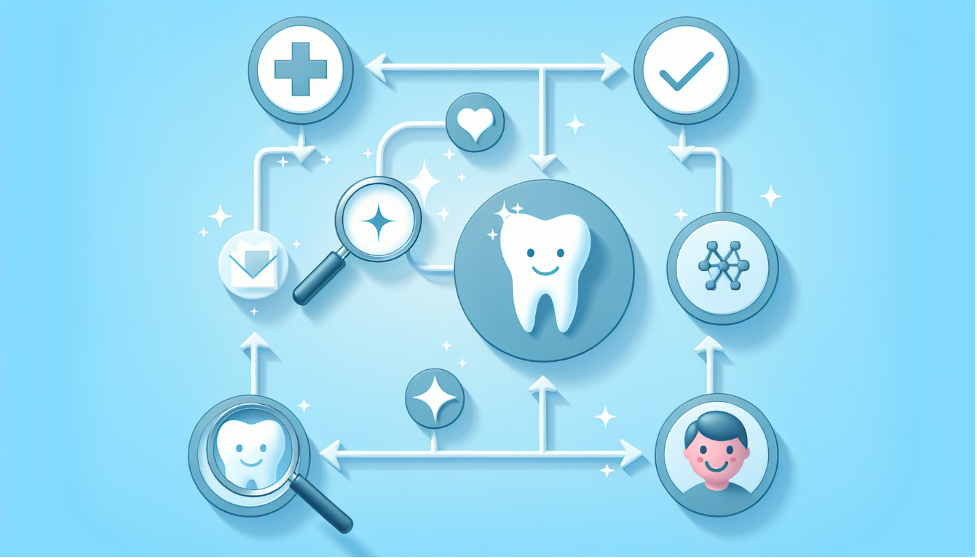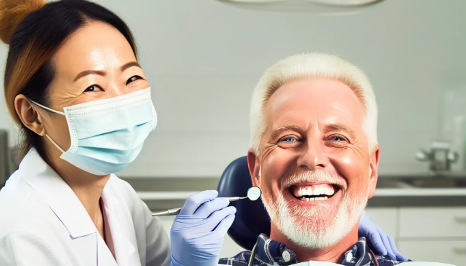Dentists That Accept Medicaid
Need a dentist that accepts Medicaid? Securing quality dental care within your Medicaid plan could be simple with this resourceful guide. Find out exactly where and how to find dentists ready to serve Medicaid patients, understand what services you may be entitled to, and manage your dental health effectively.
Key Takeaways
- Locating a dentist who accepts Medicaid could be accomplished using online locator tools, contacting local health departments, or visiting Federally Qualified Health Centers, with necessary verification of current Medicaid acceptance.
- Medicaid dental coverage may vary, with some services offering comprehensive services for children, while adults may be limited to emergency services, and potential lack of extensive dental care, which could emphasize the importance of understanding the specifics of one’s coverage.
- Maintaining oral health with Medicaid will likely involve being enrolling in a suitable dental plan, preparing for dental appointments with necessary documentation and questions, regular check-ups, and employing preventive care at home, which may be complemented by additional support from patient advocacy groups and community outreach programs.
Compare Plans in One Step!
Enter Zip Code
Finding a Medicaid-Accepting Dentist in Your Area
The initial step in maintaining oral health will likely involve locating a dentist who accepts Medicaid. This may ensure that you may receive the necessary dental care without exhausting your finances.
Online resources could be a significant help, but there may also be ways to find a Medicaid-accepting dentist offline, such as contacting your local health department or visiting Federally Qualified Health Centers. Each method has its own merits, and you could use a combination of these strategies to find a dentist who meets your needs.

Utilize Online Dentist Locators
Online dentist locators could help you find local dentists who accept Medicaid. These tools will likely enable rapid identification of potential dentists, which could save you time and effort. You may use these locators to search for dentists based on parameters like dentist location, specialty, and the fact that they accept Medicaid.
Websites like Insure Kids Now, DentaQuest, and Zocdoc could provide comprehensive databases of dentists who accept Medicaid. These sites usually have a filtering mechanism that allows you to specifically locate Medicaid-accepting healthcare providers.
Remember, it’s always a good idea to verify with the dental office if they accept Medicaid patients, including new patients, before scheduling an appointment.
Contact Local Health Departments
Local health departments may also be a valuable resource in your quest to find a dentist who accepts Medicaid. These departments will likely maintain a list of Medicaid-accepting dental providers in your area and might be able to provide referrals if needed.

You may find contact information for your local health department using tools like NACCHO or CDC health directories. Once you have the contact information, you can ask them a range of questions about Medicaid-accepting dentists in your area, including their services, potential restrictions or limitations, and how to schedule an appointment.
Visit Federally Qualified Health Centers
Federally Qualified Health Centers (FQHCs) are outpatient clinics that receive federal funding to provide healthcare services to medically underserved areas and populations. These centers could offer a range of services, including:
- Primary care
- Dental care
- Preventive care
- Prescription medications
FQHCs could be an excellent resource for those seeking dental care, especially for Medicaid patients in need of special health care.
You may find an FQHC in your area by using resources like the HRSA Health Center locator tool or the Find a Health Center website. Always verify if the FQHC accepts Medicaid for dental services before scheduling an appointment.
Dental Services Covered by Medicaid
Once you’ve found a dentist who accepts Medicaid, it’s crucial to understand what dental services could be covered by your plan. Medicaid will likely offer a range of dental services, including:
- Check-ups
- X-rays
- Fluoride treatments
- Dental sealants
- Fillings
- Other necessary treatments
However, the extent of coverage may differ for children and adults. Medicaid could cover a range of services for children, such as:
- regular dental cleanings and exams
- fluoride treatments
- dental sealants
- fillings
- crowns
- extractions
For adults, the coverage may vary by state, with most states potentially offering emergency dental services and comprehensive dental care.
Importance of Pediatric Dentistry
Pediatric dentistry will likely play a vital role in a child’s overall health and development. This could provide a variety of treatment options and specialized expertise to address the dental needs of children, including their teeth, gums, and overall oral health. Regular dental visits may prevent dental issues such as cavities, gum disease, and misaligned teeth.

A child should have their first dental visit by the age of 12 months, or within six months after their first tooth appears. Regular check-ups from this age can help maintain your child’s oral health.
Dental Care for Adults
Adult dental care under Medicaid may be limited but is still essential for maintaining oral health. While most states might offer emergency dental services for adults, others may also provide comprehensive dental care. Routine procedures may be covered, as well as services like:
- bridges
- crowns
- implants
- orthodontics
Several strategies adults could employ to maximize their utilization of Medicaid for dental care may include:
- Leveraging states that have expanded Medicaid to potentially encompass comprehensive dental benefits
- Simplifying administrative processes for dentists
- Fostering awareness of oral health
These strategies could help individuals make the most of their Medicaid coverage for dental services.
How to Enroll in a Dental Plan That Accepts Medicaid
After finding a dentist who accepts Medicaid and understanding your coverage, the next step is enrolling in a Medicaid dental plan. This process can be completed by calling one of our licensed agents at 1-833-641-4938 (TTY 711), Mon-Fri 8 am-9 pm EST.
They can provide comprehensive information, personalized guidance, and ongoing assistance to navigate the enrollment process for private insurance companies, making it easier for beneficiaries to make informed decisions about their healthcare.

Remember to understand your Medicaid dental coverage before enrolling. You can visit the Dentistry Guide website to learn more about:
- How Medicaid dental coverage operates
- The eligibility requirements
- Application procedures
- Potential coverage programs.
Understanding Your Coverage
Understanding your Medicaid dental coverage will likely be crucial before you start using it. Some important points to keep in mind could include:
- Coverage may include dental services for all child enrollees and individuals under the age of 21.
- Coverage for adults may vary from state to state.
- Certain dental services may require pre-approval or pre-authorization.
Knowing the extent of your coverage could help you plan your dental care and potentially avoid unexpected costs.
Changing or Updating Your Plan
If your current plan isn’t meeting your needs, you have the option to change or update it by contacting one of our agents by phone. Our licensed agents can assist you in selecting a plan that meets your requirements.
When considering a plan change, it’s important to:
- Carefully examine the dental plan and program information
- Consider your dental care requirements
- Seek advice from family, friends, and your dentist
- Compare various plans
- Verify if your preferred dentist is affiliated with the plan’s network.
Preparing for Your First Appointment
Once enrolled in a Medicaid dental plan, preparation for your first appointment is the next step. The first appointment with a Medicaid-accepting dentist could be a significant stride towards preserving your oral health. Before your appointment, it’s advisable to fill out an oral health questionnaire and undergo a dental risk assessment.
Remember to bring necessary documents such as a photo ID and your Medicaid Insurance card. Providing a comprehensive overview of your health history, including past illnesses and a list of current prescriptions, could also assist your dentist in providing the best possible care.
What to Bring
When you go to your first dental appointment, you may need to bring a photo ID, such as a state-issued driver’s license. Bringing your Medicaid Insurance card may also confirm your insurance coverage.
In addition to these documents, you will likely need to provide a comprehensive overview of your health history. This may include past illnesses and a list of current prescriptions. Sharing this information with your dentist could help ensure you receive the most appropriate and effective care.
Questions to Ask Your Dentist
You could ask your dentist about the potential:
- Treatment options
- Preventive care measures
- The costs that may be associated with different treatments
- Alternative treatments
- Associated benefits
- Treatment duration
You may also want to discuss the potential costs of treatment and how your Medicaid coverage could help. Understanding how Medicaid may cover different dental services might help you avoid unexpected expenses and potentially ensure you get the most out of your coverage.
Tips for Maintaining Oral Health with Medicaid
Another important consideration is maintaining your oral health. Regular dental check-ups and cleanings are essential for maintaining oral health and detecting issues early.
In addition to these, practicing good oral hygiene at home could help prevent dental problems and reduce the need for costly treatments.
Medicaid will likely cover preventive dental care, such as cleanings and fluoride treatments, but the specifics of the coverage may differ from state to state.
Regular Check-Ups and Cleanings
Maintaining oral health will likely necessitate regular dental check-ups and cleanings. These procedures could help detect oral health issues early and prevent plaque, tartar, cavities, and tooth decay.

These visits may also include diagnostic and preventive services such as examinations, x-rays, and professional teeth cleanings. Regular check-ups and cleanings could contribute to the maintenance of good oral health and the prevention of diseases such as heart disease.
Preventive Care at Home
In addition to regular dental visits, practicing good oral hygiene at home will likely be crucial in maintaining your oral health. Here are some regular practices that could significantly help prevent dental issues:
- Brushing twice daily
- Flossing
- Using mouthwash
- Adhering to a healthy diet
Toothpaste and mouthwash containing fluoride may be recommended for cavity prevention, while mouthwashes with active ingredients such as chlorhexidine, cetylpyridinium chloride, and essential oils could also be beneficial.
Remember, maintaining good oral health isn’t just about seeing a dentist; it’s also about taking care of your teeth and gums daily.
Accessing Additional Support and Resources
Though Medicaid might cover a substantial part of your dental care needs, tapping into additional resources could help ease the process. These resources might include patient advocacy groups and community outreach programs, which could provide additional support and resources to help you navigate the healthcare system and access necessary dental care.

Some of these resources may also provide information about Medicaid eligibility and connect you to other resources and services. They could also offer dental services and resources to help you maintain your oral health.
Patient Advocacy Groups
Patient advocacy groups may serve as a valuable aid in navigating the healthcare system. These organizations may provide:
- Representation and support to patients and their families
- Case management services
- Advocacy for accessible healthcare
- Assistance with medical bills
They may also assist in researching treatment options, potentially provide insurance and billing support, and advocate for reduced dental health disparities. You may find these groups online or through referrals from healthcare professionals. These groups could provide resources and information that could enhance your understanding of the potential dental benefits offered by Medicaid.
Community Outreach Programs
Medicaid patients may also find community outreach programs useful. Certain programs may provide information and resources that could help you enroll in Medicaid and access dental services. These could offer dental services, such as dental exams, cleanings, and other treatments.
These programs could be found through resources such as:
- health insurance providers
- community health centers
- dental schools
- dental provider community dental clinics
So whether you’re enrolling in Medicaid for the first time or looking for ways to maintain your oral health, these resources might be able to provide the support you need.
Summary
Finding a dentist who accepts Medicaid and understanding your coverage could be an essential part of maintaining your oral health. With the right resources and strategies, you may successfully navigate the system, find a dentist who accepts Medicaid, and maintain your oral health.
Remember, oral health is an important part of your overall well-being, and with Medicaid, you will likely have the support you need.
Frequently Asked Questions
→ Does Medicaid cover dental?
Yes, Medicaid will likely cover some dental care services for adults and children if they are medically necessary and provided by a dentist who accepts Healthy Connections Medicaid.
→ What dental services are covered by Medicaid?
Medicaid could cover a range of dental services such as check-ups, x-rays, fluoride treatments, sealants, fillings, and other necessary treatments. These services may be beneficial for your dental health.
→ How can I find a dentist who accepts Medicaid?
You may find a dentist who accepts Medicaid by using online dentist locators, contacting your local health department, or visiting Federally Qualified Health Centers. These resources could assist you access the dental care you need.
→ How often should I have dental check-ups and cleanings?
You should have dental check-ups and cleanings every 6 months if you are younger than 21, and every 12 months if you are 21 or older. Regular check-ups could help maintain good oral health and prevent dental issues.

ZRN Health & Financial Services, LLC, a Texas limited liability company



